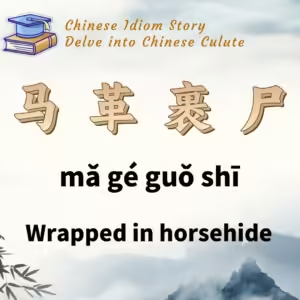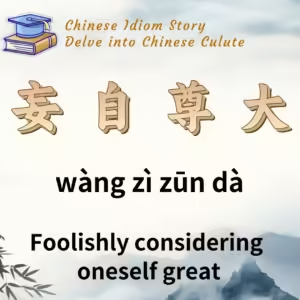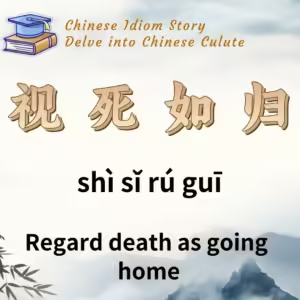
Chinese Idiom: 马革裹尸 (Ma Ge Guo Shi)
English Translation: Wrapped in horsehide
pīn yīn: mǎ gé guǒ shī
Idiom Meaning: Describes a heroic determination to fight bravely and face death with courage, symbolizing a willingness to sacrifice oneself for the country.
Historical Source: Hou Han Shu · Ma Yuan Zhuan (《后汉书·马援传》), a historical text by Fan Ye from the Southern Dynasty.
Idiom Story:
Hou Han Shu (The Book of the Later Han) is a significant historical work following Shiji (Records of the Grand Historian) and Han Shu (Book of Han). It chronicles the history of the Han Dynasty and includes notable figures such as Ma Yuan, a distinguished general of the early Eastern Han Dynasty.
Ma Yuan (44–49 AD) was a celebrated general known for his military achievements. During Emperor Guangwu’s reign, Ma Yuan successfully quelled the rebellion in Jiaozhi (present-day northern Vietnam) and was returning to Luoyang. As he approached the city, many old friends and admirers came to greet him.
Among them was Meng Ji, a well-spoken and strategic advisor. After offering his congratulations, Meng Ji indulged in some flattery, which displeased Ma Yuan. Ma Yuan expressed his frustration, saying he expected more valuable insights. He reflected on how the former general Lu Bodde, who had expanded the empire’s territory significantly, had only received a modest reward, while his own relatively minor achievements had been met with much greater honor. He questioned how such rewards could be sustained.
Ma Yuan then expressed his desire to continue serving by leading campaigns against the Xiongnu and Wuhuan tribes, who were still troubling the northern borders. He stated that a true warrior should die on the battlefield, with his body wrapped in horsehide (a symbol of humble and noble death), rather than living out old age in comfort with family.
Meng Ji was deeply impressed and remarked, “A true hero should indeed be like this.” This expression of valor and dedication became embodied in the phrase “马革裹尸,” which signifies a profound commitment to noble and self-sacrificial ideals.
Thus, “马革裹尸” (Mǎ gé guǒ shī) has come to represent the spirit of unwavering dedication and readiness to lay down one’s life for a noble cause.






